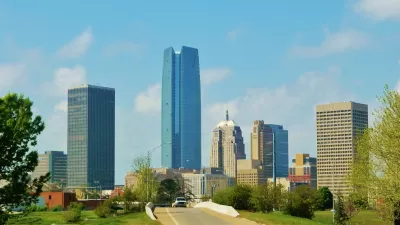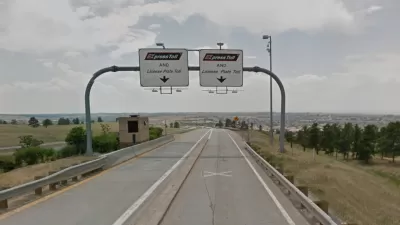In the wake of voter rejection of automatic indexing of the state gas tax, Massachusetts legislators may do away with the tax altogether. They are considering a trial of the Oregon model of road usage charge.
The Bay State is looking at "an estimated backlog of $10 billion worth of basic maintenance work on roads and bridges - a number compounded by the steady decline in federal highway dollars," writes Christian M. Wade for the Eagle-Tribune.
The state collected more than $658 million in its last budget year from the gas tax, according to the Department of Revenue. The majority of that money goes into a fund for transportation work, which is also used to pay back money borrowed for major projects.
With those dire figures in mind, state Sen. Jason Lewis, D-Winchester, has sponsored S.1851: "An Act to explore alternative funding sources to ensure safe and reliable transportation."
"As we add more fuel-efficient vehicles to the roads, the gas tax is going to be declining, and that will exacerbate our revenue shortfalls," said Lewis. "We need to come up with a more reliable funding source."
The leader in alternative funding is Oregon which began a road usage charge program for 5,000 motorists on July 1, after launching two earlier pilot programs. If S.1851 passes, Massachusetts will begin a pilot program fro 1,000 volunteers. California has already passed similar legislation.
S. 1851 uses the term "vehicle mileage user fee" while Oregon's program uses "road usage charge." Other terms for the fee include "mileage-based user fee" and vehicle-miles-traveled or VMT fee. But they all mean the same thing: charging motorists not by how much fuel they burn but how many miles they drive.
"The measure doesn't specify how much motorists will be charged or how data will be collected," writes Wade. "Details are left to the state Department of Transportation as part of the pilot program."
Wade doesn't write that the AAA is endorsing the measure, but their statement comes pretty close:
"Revenues from gas taxes are down, we have more electric and fuel-efficient cars on the road these days, so we need to look at alternatives, in addition to considering increases in the state gas tax," Mary Maguire, a spokeswoman for the Northeast chapter of the American Automobile Association, said.
The Bay State did increase its gas tax by 3 cents to 26.5 cents a gallon two years ago, overriding the veto of Governor Deval Patrick who felt the increase was too small. However, the tax indexing in the bill angered anti-tax activists who launched a referendum to repeal just that part of the bill, and they won in November.
Wade provides an update for the Oregon program which appears to be off to a slow start. "Lawmakers there authorized a project for up to 5,000 motorists, and about 900 have signed up to date, said Michelle Godfrey, a spokeswoman for the Oregon Department of Transportation," writes Wade.
"One of the things we need to prove, besides ensuring that the technology actually works, is whether or not people will accept the concept," Godfrey said. "We want people to buy into it, otherwise it just won't work."
Even if S.1851 passes (and that's one big "if," considering neighboring Connecticut was all too quick to dismiss a similar bill), it's a long road from a pilot to a statewide program, so legislators are going to have to continue to work on conventional transportation funding legislation. If they haven't already, they may wish to review the policy August report by the New England Public Policy Center: "State Highway Funding in New England: The Road to Greater Fiscal Sustainability."
FULL STORY: GPS systems could tax drivers for miles traveled

Study: Maui’s Plan to Convert Vacation Rentals to Long-Term Housing Could Cause Nearly $1 Billion Economic Loss
The plan would reduce visitor accommodation by 25,% resulting in 1,900 jobs lost.

North Texas Transit Leaders Tout Benefits of TOD for Growing Region
At a summit focused on transit-oriented development, policymakers discussed how North Texas’ expanded light rail system can serve as a tool for economic growth.

Why Should We Subsidize Public Transportation?
Many public transit agencies face financial stress due to rising costs, declining fare revenue, and declining subsidies. Transit advocates must provide a strong business case for increasing public transit funding.

How to Make US Trains Faster
Changes to boarding platforms and a switch to electric trains could improve U.S. passenger rail service without the added cost of high-speed rail.

Columbia’s Revitalized ‘Loop’ Is a Hub for Local Entrepreneurs
A focus on small businesses is helping a commercial corridor in Columbia, Missouri thrive.

Invasive Insect Threatens Minnesota’s Ash Forests
The Emerald Ash Borer is a rapidly spreading invasive pest threatening Minnesota’s ash trees, and homeowners are encouraged to plant diverse replacement species, avoid moving ash firewood, and monitor for signs of infestation.
Urban Design for Planners 1: Software Tools
This six-course series explores essential urban design concepts using open source software and equips planners with the tools they need to participate fully in the urban design process.
Planning for Universal Design
Learn the tools for implementing Universal Design in planning regulations.
City of Santa Clarita
Ascent Environmental
Institute for Housing and Urban Development Studies (IHS)
City of Grandview
Harvard GSD Executive Education
Toledo-Lucas County Plan Commissions
Salt Lake City
NYU Wagner Graduate School of Public Service




























